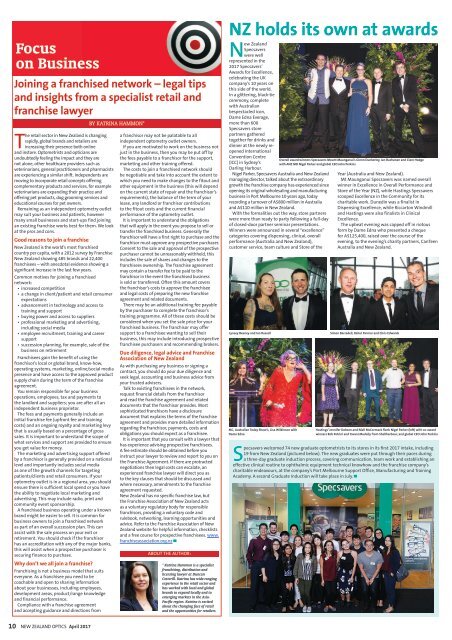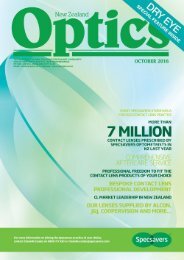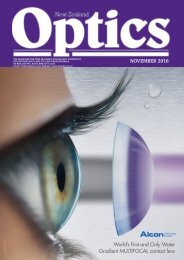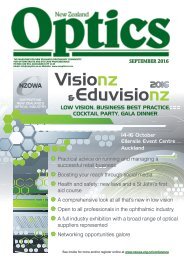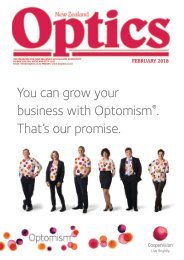April 2017
Create successful ePaper yourself
Turn your PDF publications into a flip-book with our unique Google optimized e-Paper software.
Focus<br />
on Business<br />
Joining a franchised network – legal tips<br />
and insights from a specialist retail and<br />
franchise lawyer<br />
The retail sector in New Zealand is changing<br />
rapidly, global brands and retailers are<br />
increasing their presence both online<br />
and instore. Optometrists and opticians are<br />
undoubtedly feeling the impact and they are<br />
not alone, other healthcare providers such as<br />
veterinarians, general practitioners and pharmacists<br />
are experiencing a similar shift. Independents are<br />
moving to incorporate retail concepts offering<br />
complementary products and services, for example<br />
veterinarians are expanding their practice and<br />
offering pet products, dog grooming services and<br />
educational courses for pet owners.<br />
Remaining as an independent optometry outlet<br />
may suit your business and patients, however<br />
many small businesses and start-ups find joining<br />
an existing franchise works best for them. We look<br />
at the pros and cons.<br />
Good reasons to join a franchise<br />
New Zealand is the world’s most franchised<br />
country per capita, with a 2012 survey by Franchise<br />
New Zealand showing 485 brands and 22,400<br />
franchisees – with anecdotal evidence showing a<br />
significant increase in the last few years.<br />
Common motives for joining a franchised<br />
network:<br />
• increased competition<br />
• a change in client/patient and retail consumer<br />
expectations<br />
• advancement in technology and access to<br />
training and support<br />
• buying power and access to suppliers<br />
• professional marketing and advertising,<br />
including social media<br />
• employee recruitment, training and career<br />
support<br />
• succession planning, for example, sale of the<br />
business on retirement<br />
Franchisees gain the benefit of using the<br />
franchisor’s local or global brand, know-how,<br />
operating systems, marketing, online/social media<br />
presence and have access to the approved product<br />
supply chain during the term of the franchise<br />
agreement.<br />
You remain responsible for your business<br />
operations, employees, tax and payments to<br />
the landlord and suppliers; you are after all an<br />
independent business proprietor.<br />
The fees and payments generally include an<br />
initial franchise fee (upfront fee and training<br />
costs) and an ongoing royalty and marketing levy<br />
that is usually based on a percentage of gross<br />
sales. It is important to understand the scope of<br />
what services and support are provided to ensure<br />
you get value for money.<br />
The marketing and advertising support offered<br />
by a franchisor is generally provided on a national<br />
level and importantly includes social media<br />
as one of the growth channels for targeting<br />
patients/clients and retail consumers. If your<br />
optometry outlet is in a regional area, you should<br />
ensure there is sufficient local spend or you have<br />
the ability to negotiate local marketing and<br />
advertising. This may include radio, print and<br />
community event sponsorship.<br />
A franchised business operating under a known<br />
brand might be easier to sell. It is common for<br />
business owners to join a franchised network<br />
as part of an overall succession plan. This can<br />
assist with the sale process on your exit or<br />
retirement. You should check if the franchisor<br />
has an accreditation with any of the major banks,<br />
this will assist when a prospective purchaser is<br />
securing finance to purchase.<br />
Why don’t we all join a franchise?<br />
Franchising is not a business model that suits<br />
everyone. As a franchisee you need to be<br />
coachable and open to sharing information<br />
about your businesses, including employees,<br />
development areas, product/range knowledge<br />
and financial performance.<br />
Compliance with a franchise agreement<br />
and accepting guidance and directions from<br />
BY KATRINA HAMMON*<br />
a franchisor may not be palatable to all<br />
independent optometry outlet owners.<br />
If you are motivated to work on the business not<br />
just in the business, then you may be put off by<br />
the fees payable to a franchisor for the support,<br />
marketing and other training offered.<br />
The costs to join a franchised network should<br />
be negotiable and take into account the extent to<br />
which you need to make changes to the fitout and<br />
other equipment in the business (this will depend<br />
on the current state of repair and the franchisor’s<br />
requirements), the balance of the term of your<br />
lease, any landlord or franchisor contributions<br />
to the fitout costs and the current financial<br />
performance of the optometry outlet.<br />
It is important to understand the obligations<br />
that will apply in the event you propose to sell or<br />
transfer the franchised business. Generally the<br />
franchisor will have a first right to purchase and the<br />
franchisor must approve any prospective purchaser.<br />
Consent to the sale and approval of the prospective<br />
purchaser cannot be unreasonably withheld, this<br />
includes the sale of shares and changes to the<br />
franchisees ownership. The franchise agreement<br />
may contain a transfer fee to be paid to the<br />
franchisor in the event the franchised business<br />
is sold or transferred. Often this amount covers<br />
the franchisor’s costs to approve the franchisee<br />
and legal costs of preparing the new franchise<br />
agreement and related documents.<br />
There may be an additional training fee payable<br />
by the purchaser to complete the franchisor’s<br />
training programme. All of these costs should be<br />
considered when you set the sale price for your<br />
franchised business. The franchisor may offer<br />
support to a franchisee wanting to sell their<br />
business, this may include introducing prospective<br />
franchisee purchasers and recommending brokers.<br />
Due diligence, legal advice and Franchise<br />
Association of New Zealand<br />
As with purchasing any business or signing a<br />
contract, you should do your due diligence and<br />
seek legal, accounting and business advice from<br />
your trusted advisers.<br />
Talk to existing franchisees in the network,<br />
request financial details from the franchisor<br />
and read the franchise agreement and related<br />
documents that the franchisor provides. Most<br />
sophisticated franchisors have a disclosure<br />
document that explains the terms of the franchise<br />
agreement and provides more detailed information<br />
regarding the franchisor, payments, costs and<br />
obligations you should expect as a franchisee.<br />
It is important that you consult with a lawyer that<br />
has experience advising prospective franchisees.<br />
A fee estimate should be obtained before you<br />
instruct your lawyer to review and report to you on<br />
the Franchise Agreement. If there are protracted<br />
negotiations then legal costs can escalate, an<br />
experienced franchise lawyer will direct you as<br />
to the key clauses that should be discussed and<br />
where necessary, amendments to the franchise<br />
agreement requested.<br />
New Zealand has no specific franchise law, but<br />
the Franchise Association of New Zealand acts<br />
as a voluntary regulatory body for responsible<br />
franchisors, providing a voluntary code and<br />
rulebook, networking, learning opportunities and<br />
advice. Refer to the Franchise Association of New<br />
Zealand website for helpful information, checklists<br />
and a free course for prospective franchisees. www.<br />
franchiseassociation.org.nz ▀<br />
ABOUT THE AUTHOR:<br />
* Katrina Hammon is a specialist<br />
franchising, distribution and<br />
licensing lawyer at Duncan<br />
Cotterill. Katrina has wide-ranging<br />
experience in the retail sector and<br />
has worked with local and global<br />
brands to expand locally and to<br />
emerging markets in the Asia-<br />
Pacific region. Katrina is excited<br />
about the changing face of retail<br />
and the opportunities for retailers.<br />
NZ holds its own at awards<br />
New Zealand<br />
Specsavers<br />
were well<br />
represented in the<br />
<strong>2017</strong> Specsavers’<br />
Awards for Excellence,<br />
celebrating the UK<br />
company’s 10 years on<br />
this side of the world.<br />
In a glittering, black-tie<br />
ceremony, complete<br />
with Australian<br />
bespectacled icon,<br />
Dame Edna Everage,<br />
more than 600<br />
Specsavers store<br />
partners gathered<br />
together for drinks and<br />
dinner at the newly reopened<br />
International<br />
Convention Centre<br />
(ICC) in Sydney’s<br />
Darling Harbour.<br />
Nigel Parker, Specsavers Australia and New Zealand<br />
managing director, talked about the extraordinary<br />
growth the franchise company has experienced since<br />
opening its original wholesaling and manufacturing<br />
business in Port Melbourne 10 years ago, today<br />
recording a turnover of A$800 million in Australia<br />
and A$110 million in New Zealand.<br />
With the formalities out the way, store partners<br />
were more than ready to party following a full-day<br />
of closed-door partner seminar presentations.<br />
Winners were announced in several “excellence”<br />
categories covering dispensing, clinical, overall<br />
performance (Australia and New Zealand),<br />
customer service, team culture and Store of the<br />
Lynsey Beeney and Ian Russell<br />
MC, Australian Today Show’s, Lisa Wilkinson with<br />
Dame Edna<br />
Overall award winners Specsavers Mount Maunganui’s Glenn Dunkerley, Ian Buchanan and Clare Hodge<br />
with ANZ MD Nigel Parker and global CEO John Perkins<br />
Year (Australia and New Zealand).<br />
Mt Maunganui Specsavers was named overall<br />
winner in Excellence in Overall Performance and<br />
Store of the Year (NZ), while Hastings Specsavers<br />
scooped Excellence in the Community for its<br />
charitable work. Dunedin was a finalist in<br />
Dispensing Excellence, while Riccarton Windmill<br />
and Hastings were also finalists in Clinical<br />
Excellence.<br />
The upbeat evening was capped off in riotous<br />
form by Dame Edna who presented a cheque<br />
for A$125,400, raised over the course of the<br />
evening, to the evening’s charity partners, CanTeen<br />
Australia and New Zealand.<br />
Simon Barradell, Rahul Parmar and Chris Edwards<br />
Hastings’ Jennifer Dobson and Niall McCormack flank Nigel Parker (left) with co-award<br />
winners Rob Petrini and Yavani Mudally from Shellharbour, and global CEO John Perkins<br />
Specsavers welcomed 74 new graduate optometrists to its stores in its first <strong>2017</strong> intake, including<br />
19 from New Zealand (pictured below). The new graduates were put through their paces during<br />
a three-day graduate induction process, covering communication, team work and establishing an<br />
effective clinical routine to ophthalmic equipment technical knowhow and the franchise company’s<br />
charitable endeavours, at the company’s Port Melbourne Support Office, Manufacturing and Training<br />
Academy. A second Graduate Induction will take place in July. ▀<br />
10 NEW ZEALAND OPTICS <strong>April</strong> <strong>2017</strong>


